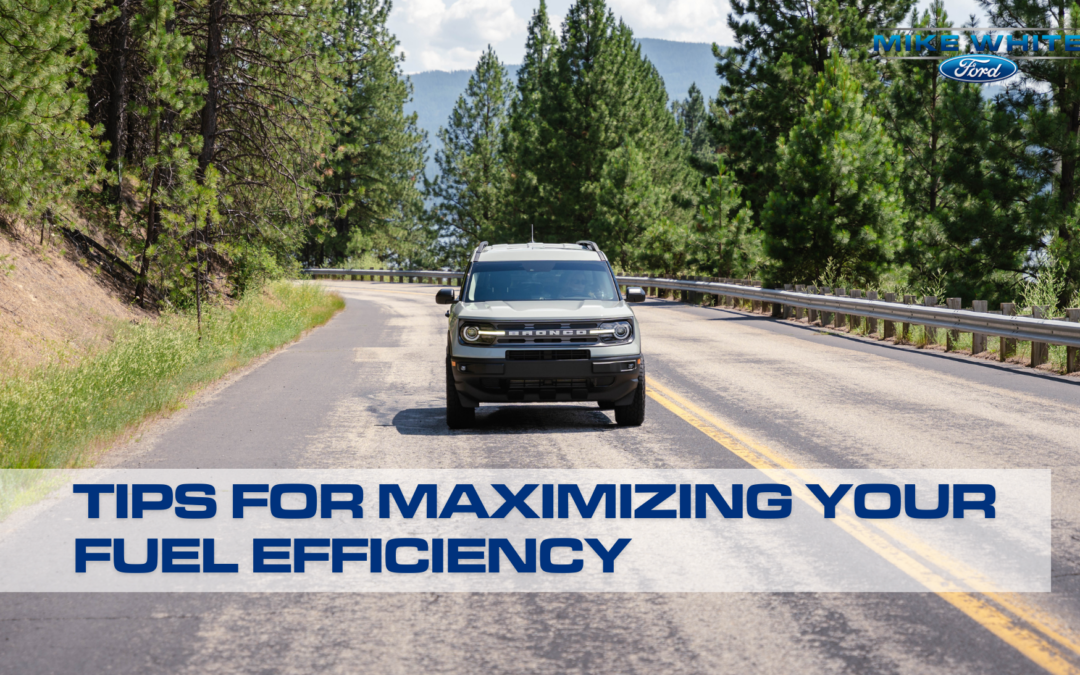With fluctuating fuel prices and environmental concerns about emissions and waste, maximizing your vehicle’s fuel economy isn’t just about saving money at the pump but also being ecologically efficient. At Mike White Ford, we know that high gas prices experienced in the last few years have impacted families, and buying a more fuel-efficient car is not an option when family budgets are already tight.
Fortunately, achieving better fuel efficiency doesn’t necessarily require expensive upgrades or even drastic lifestyle changes. However, by making a few simple adjustments to your driving habits and staying on top of your vehicle’s maintenance, you can significantly improve your vehicle’s miles per gallon.
Driving Habits That Increase Fuel Economy
The way you drive has a significant impact on your vehicle’s fuel efficiency. Here are some smart driving practices you can adopt that will stretch every gallon of gas further:
- Minimize Cold Engine Operation: Instead of idling your car to warm it up, start driving it gently until the engine reaches its optimal temperature.
- Drive Conservatively: Avoid rapid acceleration, hard braking, and excessive speeding, as these habits can significantly decrease fuel economy.
- Shift Gears Efficiently: If you drive a manual transmission, shift up as soon as possible and use your brakes rather than downshifting to slow down.
- Anticipate Road Conditions: Monitor traffic ahead and plan your maneuvers to maintain a steady pace, avoiding unnecessary acceleration and braking.
- Observe Speed Limits: Driving at moderate speeds improves safety and fuel efficiency, especially on the highway.
- Use Cruise Control Wisely: On long highway stretches, cruise control helps your vehicle maintain a constant speed and saves fuel, but be sure not to use it on slippery roads.
- Avoid Excessive Idling: Shut off your engine if you anticipate being stopped for more than a minute, as idling burns fuel unnecessarily.
- Plan Your Trips: Combine errands and plan your routes efficiently to minimize backtracking and unnecessary driving.
- Avoid High Traffic Times and Places: Sitting in stop-and-go traffic with your engine running burns up fuel. While work hours can limit your flexibility, consider adjusting your commute times by leaving early or staying later, or find out if your employer will allow you to change your work hours. You can also use alternative commute routes that are less crowded.
Maintenance Tips for Maximizing Your Car’s Fuel Efficiency
Regular maintenance keeps your vehicle running efficiently. The following maintenance tips help ensure your car is operating at its peak:
- Remove Unnecessary Weight: Clear out any unneeded items from your trunk or passenger space to reduce the weight your car has to carry.
- Perform Regular Maintenance: Stick to the maintenance schedule recommended by your vehicle’s manufacturer to keep all systems running smoothly.
- Use the Right Oil: Choose the oil specified in your owner’s manual for your engine.
- Choose Quality Fuel: Opt for high-grade gasoline and follow your car manufacturer’s recommendations for the appropriate fuel grade.
- Check Your Car’s Tire Pressure: Properly inflate your tires to reduce rolling resistance and improve fuel efficiency.
- Replace Air Filters: Regularly check and replace dirty air filters to ensure optimal engine performance.
- Address Check Engine Lights Promptly: Don’t ignore warning lights, as they can indicate issues affecting fuel economy and emissions.
- Avoid Rooftop Cargo: Minimize aerodynamic drag by avoiding rooftop carriers whenever possible.
- Park Strategically: On sunny days, park in shaded areas to reduce the need for excessive air conditioning use during hot weather. Alternatively, tint your windows or use shades for your windows and leave a window partially open to release hot air.
You can maximize your fuel economy by adopting specific driving habits and staying proactive about vehicle maintenance. Whether commuting to work, running errands, or embarking on a road trip, driving smarter and maintaining your vehicle better will help you get the most out of every gallon of gas.
Driving the Right Vehicle
All of these practices can help you get more miles per gallon. Still, if your car is not fuel efficient, you may be thinking about purchasing a more economical vehicle. If so, Mike White Ford would happily show you our selection of more fuel-efficient cars. If fuel usage is one of your primary concerns in choosing a car, consider these factors:
- Size Matters: Choose the smallest vehicle that meets your daily requirements to maximize fuel efficiency. For example, as children grow up and move out of the house, many people no longer need large SUVs or vans. Smaller, lighter cars need less fuel, but make sure the vehicle you choose will satisfy your other needs, such as having four-wheel drive for driving in the snow or having sufficient power if you live in the mountains.
- Consider Hybrid Options: Hybrid vehicles typically offer better fuel economy than traditional gasoline-powered cars.
- Research Fuel Efficiency Ratings: Look for models with high fuel efficiency ratings and choose the most efficient engine and transmission options.
For more information about the fuel efficiency of our vehicles, or if you are interested in investigating electric vehicle (EV) options, call Mike White Ford in Coeur d’Alene or Sandpoint, Idaho, today.

